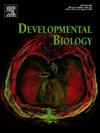Mesenchymal cell contractility regulates villus morphogenesis and intestinal architecture
IF 2.5
3区 生物学
Q2 DEVELOPMENTAL BIOLOGY
引用次数: 0
Abstract
The large absorptive surface area of the small intestine is imparted by finger-like projections called villi. Villi formation is instructed by stromal-derived clusters of cells which have been proposed to induce epithelial bending through actomyosin contraction. Their functions in the elongation of villi have not been studied. Here, we explored the function of mesenchymal contractility at later stages of villus morphogenesis. We induced contractility specifically in the mesenchyme of the developing intestine through inducible overexpression of the RhoA GTPase activator Arhgef11. This resulted in overgrowth of the clusters through a YAP-mediated increase in cell proliferation. While epithelial bending occurred in the presence of contractile clusters, the resulting villi had architectural defects, being shorter and wider than controls. These villi also had defects in epithelial organization and the establishment of nutrient-absorbing enterocytes. While ectopic activation of YAP resulted in similar cluster overgrowth and wider villi, it did not affect villus elongation or enterocyte differentiation, demonstrating roles for contractility in addition to proliferation. We find that the specific contractility-induced effects were dependent upon cluster interaction with the extracellular matrix. Together, these data demonstrate effects of contractility on villus morphogenesis and distinguish separable roles for proliferation and contractility in controlling intestinal architecture.

间充质细胞收缩调节绒毛形态发生和肠道结构。
小肠的大吸收表面积是由指状突起的绒毛形成的。绒毛的形成是由基质来源的细胞群指导的,这些细胞群被认为通过肌动球蛋白收缩诱导上皮弯曲。它们在绒毛伸长中的作用尚未被研究。在此,我们探讨了绒毛形态发生后期间充质收缩的功能。我们通过诱导RhoA GTPase激活剂Arhgef11的过表达,在发育中的肠间质中特异性地诱导了收缩性。这通过yap介导的细胞增殖增加导致集群过度生长。虽然上皮弯曲发生在有收缩簇的情况下,但产生的绒毛具有结构缺陷,比对照组更短更宽。这些绒毛在上皮组织和营养吸收肠细胞的建立上也存在缺陷。虽然YAP的异位激活导致了类似的簇过度生长和更宽的绒毛,但它不影响绒毛伸长或肠细胞分化,表明除了增殖外,还具有收缩性作用。我们发现,特定的收缩性诱导效应依赖于簇与细胞外基质的相互作用。总之,这些数据证明了收缩性对绒毛形态发生的影响,并区分了增殖和收缩性在控制肠道结构中的可分离作用。
本文章由计算机程序翻译,如有差异,请以英文原文为准。
求助全文
约1分钟内获得全文
求助全文
来源期刊

Developmental biology
生物-发育生物学
CiteScore
5.30
自引率
3.70%
发文量
182
审稿时长
1.5 months
期刊介绍:
Developmental Biology (DB) publishes original research on mechanisms of development, differentiation, and growth in animals and plants at the molecular, cellular, genetic and evolutionary levels. Areas of particular emphasis include transcriptional control mechanisms, embryonic patterning, cell-cell interactions, growth factors and signal transduction, and regulatory hierarchies in developing plants and animals.
 求助内容:
求助内容: 应助结果提醒方式:
应助结果提醒方式:


